北师大版初二英语下册unit
初二下英语北师大版书
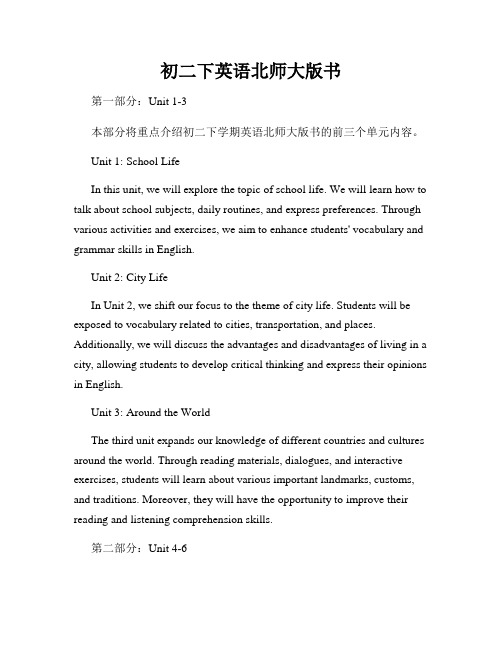
初二下英语北师大版书第一部分:Unit 1-3本部分将重点介绍初二下学期英语北师大版书的前三个单元内容。
Unit 1: School LifeIn this unit, we will explore the topic of school life. We will learn how to talk about school subjects, daily routines, and express preferences. Through various activities and exercises, we aim to enhance students' vocabulary and grammar skills in English.Unit 2: City LifeIn Unit 2, we shift our focus to the theme of city life. Students will be exposed to vocabulary related to cities, transportation, and places. Additionally, we will discuss the advantages and disadvantages of living in a city, allowing students to develop critical thinking and express their opinions in English.Unit 3: Around the WorldThe third unit expands our knowledge of different countries and cultures around the world. Through reading materials, dialogues, and interactive exercises, students will learn about various important landmarks, customs, and traditions. Moreover, they will have the opportunity to improve their reading and listening comprehension skills.第二部分:Unit 4-6本部分将重点介绍初二下学期英语北师大版书的第四至第六个单元内容。
北师大版初中英语八年级下册词汇讲解Unit1 Technology and the Future(词汇)

Unit 1 School of the Future词汇精讲精练:词汇精讲1. popular(1)popular作形容词,意为“流行的,受人欢迎的”。
常用短语为be popular with,意为“受……的欢迎”。
例如:The most popular sport is football.最流行的运动是足球。
He is popular with our classmates.他在我们班里有人缘。
(2)popular作形容词,意为“民众的,大众的”。
例如:Popular education is one of our major objectives.民众教育是我们的主要目标之一。
He speaks in popular language.他用通俗的语言讲话。
【拓展】popularity作名词,意为“普及,流行,大众化”。
例如:Golf has gained popularity among the wealthy in my country. 高尔夫球已在我国富有的人中流行起来。
The popularity of p rivate cars is changing the people’s life style.私家车的普及正在改变着人们的生活方式。
2. inventioninvention作可数名词,意为“发明,创作”。
例如:Fax machines were a wonderful invention at the time.传真机在当时是一项了不起的发明。
【拓展】(1)invent 作动词,意为“发明,创造”。
例如:Edison invented the light bulb.爱迪生发明了电灯。
(2)invent还可以表示“虚构”。
例如:The whole story was invented.整个故事是虚构的。
(3)inventor作可数名词,意为“发明家;发明者”。
例如:Edison was a great inventor.爱迪生是一位伟大的发明家。
北师大版初中英语八年级下册词汇讲解Unit1 Technology and the Future(词汇)

Unit 1 School of the Future词汇精讲精练:词汇精讲1. popular(1)popular作形容词,意为“流行的,受人欢迎的”。
常用短语为be popular with,意为“受……的欢迎”。
例如:The most popular sport is football.最流行的运动是足球。
He is popular with our classmates.他在我们班里有人缘。
(2)popular作形容词,意为“民众的,大众的”。
例如:Popular education is one of our major objectives.民众教育是我们的主要目标之一。
He speaks in popular language.他用通俗的语言讲话。
【拓展】popularity作名词,意为“普及,流行,大众化”。
例如:Golf has gained popularity among the wealthy in my country. 高尔夫球已在我国富有的人中流行起来。
The popularity of p rivate cars is changing the people’s life style.私家车的普及正在改变着人们的生活方式。
2. inventioninvention作可数名词,意为“发明,创作”。
例如:Fax machines were a wonderful invention at the time.传真机在当时是一项了不起的发明。
【拓展】(1)invent 作动词,意为“发明,创造”。
例如:Edison invented the light bulb.爱迪生发明了电灯。
(2)invent还可以表示“虚构”。
例如:The whole story was invented.整个故事是虚构的。
(3)inventor作可数名词,意为“发明家;发明者”。
例如:Edison was a great inventor.爱迪生是一位伟大的发明家。
北师大版八年级下册英语课件《Unit1 Lesson 2Online life 》 (共21张PPT)

Dr Zheng
A
People shop online, play games , and social media is popular.
Abo Opinio B,D
ut n
the Examp use the Internet more for
futu les work, school, taking exams, buying food,
Most people will still buy food at the market. People will want to go to the doctors when they’re ill.
Homework
1. Read the text 3 times. 2. Copy the new words.
I think… I don’t think …
I believe I dter science
教 授 ?
professor at
university
总? 裁
Miss Newman the president of a website
What’s Dr Zheng’s and Miss
Newman’s opinions and his/her about
online life
Dr Zheng
Miss Newman
Abo Opinion A
ut Example now s
Abo Opinion B,D
ut the Example futur s
e
A C,E
Abo Opinio ut n now Examp
Lesson 2 Online life
play games
北师大版初中英语八年级下册词汇讲解Unit3 Festivals and Holidays(词汇)

Unit 3 Festivals and Holidays词汇精讲精练:词汇精讲1. luckluck作不可数名词,意为“运气”。
good luck意为“好运”;bad luck意为“倒霉”。
good luck to sb 意为“祝某人好运”。
例如:She wishes me good luck in the exam. 她祝我考试好运。
Good luck to you! 祝你好运!2. wishwish作动词,意为“祝愿,希望”。
“wish sb.+名词”意为“愿某人……,祝某人……”。
例如:I wish you a happy birthday. 我祝你生日快乐。
【拓展】辨析:wish与hope(1)共同点:wish/hope to do sth.意为“希望做某事”。
例如:I wish/hope to buy a bike. 我希望买一辆自行车。
(2)不同点:1)wish sb. to do sth意为“希望某人做某事”,但hope无此用法。
例如:I wish him to go. 我希望他去。
2)wish表示难以实现的“愿望”;hope表示可以实现的“希望”。
例如:I wish to get a car. 我很想得到一辆汽车。
I hope for success. 我希望成功。
3)“wish+that从句”表“愿望”,从句用虚拟语气;“hope+that从句”表“希望”,从句常用一般将来时。
例如:I wish I could fly. 要是我会飞就好了。
I hope you’ll be better soon. 我希望你很快就好起来。
4)wish可跟双宾语,但hope不能。
例如:Wish you success. 祝你成功。
5)“wish sb. +adj.”意为“祝某人……”;但hope不能这样用。
例如:I wish you happy. 我祝你们幸福。
3. millions ofmillions of意为“数百万的……,大量……”。
北师大版-八年级英语下册知识要点

北师大版-八年级英语下册知识要点Unit 1 Will People Have Robots?In this unit。
we learn about the future and how it might look。
We use the structure "see sb。
do sth." to describe seeing someone do something from start to finish。
and "see sb。
doing sth." to describe seeing someone doing something in a specific moment。
We also use "hundreds of + plural ___。
and "number + hundred + ___。
we use "from now" to describe a d of time in the future。
and "from now on" to describe the future in general.When discussing ns。
we use "I think (that)" in affirmative sentences。
"I don't think (that)" in negative sentences。
"Do you think。
" in general ns。
and "What do you think。
" in specific ns。
We also learn about the ns "on," "in," and "with," which are usedto describe different types of media or tools.In the n about money。
(北师大版)初中英语八年级下册 Unit 1单元测试(一)附答案
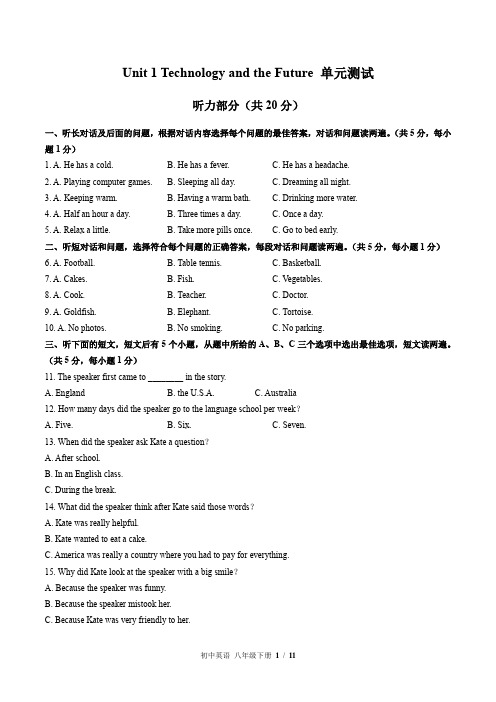
Unit 1 Technology and the Future 单元测试听力部分(共20分)一、听长对话及后面的问题,根据对话内容选择每个问题的最佳答案,对话和问题读两遍。
(共5分,每小题1分)1. A. He has a cold. B. He has a fever. C. He has a headache.2. A. Playing computer games. B. Sleeping all day. C. Dreaming all night.3. A. Keeping warm. B. Having a warm bath. C. Drinking more water.4. A. Half an hour a day. B. Three times a day. C. Once a day.5. A. Relax a little. B. Take more pills once. C. Go to bed early.二、听短对话和问题,选择符合每个问题的正确答案,每段对话和问题读两遍。
(共5分,每小题1分)6. A. Football. B. Table tennis. C. Basketball.7. A. Cakes. B. Fish. C. Vegetables.8. A. Cook. B. Teacher. C. Doctor.9. A. Goldfish. B. Elephant. C. Tortoise.10. A. No photos. B. No smoking. C. No parking.三、听下面的短文,短文后有5个小题,从题中所给的A、B、C三个选项中选出最佳选项,短文读两遍。
(共5分,每小题1分)11. The speaker first came to ________ in the story.A. EnglandB. the U.S.A.C. Australia12. How many days did the speaker go to the language school per week?A. Five.B. Six.C. Seven.13. When did the speaker ask Kate a question?A. After school.B. In an English class.C. During the break.14. What did the speaker think after Kate said those words?A. Kate was really helpful.B. Kate wanted to eat a cake.C. America was really a country where you had to pay for everything.15. Why did Kate look at the speaker with a big smile?A. Because the speaker was funny.B. Because the speaker mistook her.C. Because Kate was very friendly to her.四、听一段电话留言,根据其内容完成下面的信息卡,每空一词,电话留言读两遍。
北师大八年级下册英语
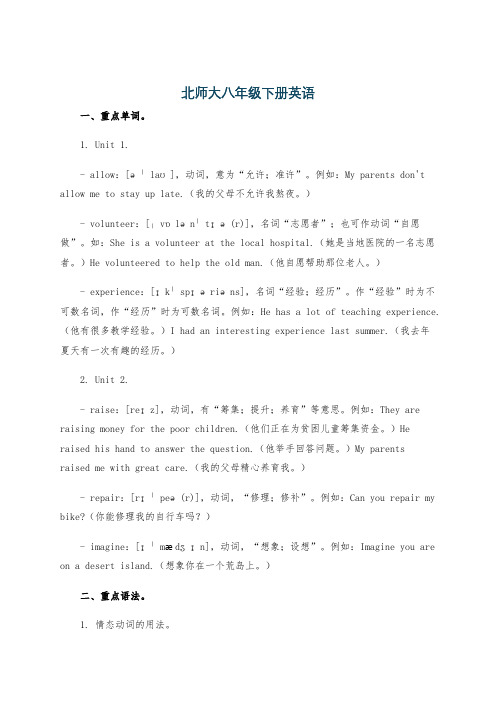
北师大八年级下册英语一、重点单词。
1. Unit 1.- allow:[əˈlaʊ],动词,意为“允许;准许”。
例如:My parents don't allow me to stay up late.(我的父母不允许我熬夜。
)- volunteer:[ˌvɒlənˈtɪə(r)],名词“志愿者”;也可作动词“自愿做”。
如:She is a volunteer at the local hospital.(她是当地医院的一名志愿者。
)He volunteered to help the old man.(他自愿帮助那位老人。
)- experience:[ɪkˈspɪəriəns],名词“经验;经历”。
作“经验”时为不可数名词,作“经历”时为可数名词。
例如:He has a lot of teaching experience.(他有很多教学经验。
)I had an interesting experience last summer.(我去年夏天有一次有趣的经历。
)2. Unit 2.- raise:[reɪz],动词,有“筹集;提升;养育”等意思。
例如:They are raising money for the poor children.(他们正在为贫困儿童筹集资金。
)He raised his hand to answer the question.(他举手回答问题。
)My parents raised me with great care.(我的父母精心养育我。
)- repair:[rɪˈpeə(r)],动词,“修理;修补”。
例如:Can you repair my bike?(你能修理我的自行车吗?)- imagine:[ɪˈmædʒɪn],动词,“想象;设想”。
例如:Imagine you are on a desert island.(想象你在一个荒岛上。
)二、重点语法。
北师大版初中英语八年级下册词汇讲解1Unit4 Dealing with Problems(词汇)
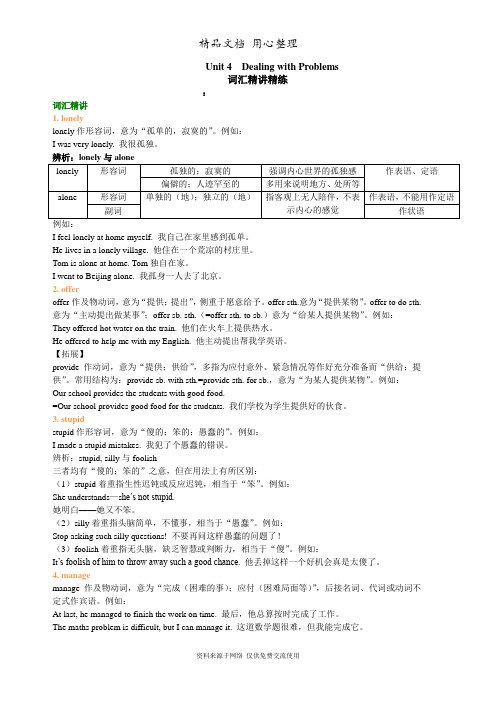
Unit 4 Dealing with Problems词汇精讲精练:词汇精讲1. lonelylonely作形容词,意为“孤单的,寂寞的”。
例如:I was very lonely. 我很孤独。
例如:I feel lonely at home myself. 我自己在家里感到孤单。
He lives in a lonely village. 他住在一个荒凉的村庄里。
Tom is alone at home. Tom独自在家。
I went to Beijing alone. 我孤身一人去了北京。
2. offeroffer作及物动词,意为“提供;提出”,侧重于愿意给予。
offer sth.意为“提供某物”。
offer to do sth.意为“主动提出做某事”;offer sb. sth.(=offer sth. to sb.)意为“给某人提供某物”。
例如:They offered hot water on the train. 他们在火车上提供热水。
He offered to help me with my English. 他主动提出帮我学英语。
【拓展】provide作动词,意为“提供;供给”,多指为应付意外、紧急情况等作好充分准备而“供给;提供”。
常用结构为:provide sb. with sth.=provide sth. for sb.,意为“为某人提供某物”。
例如:Our school provides the students with good food.=Our school provides good food for the students. 我们学校为学生提供好的伙食。
3. stupidstupid作形容词,意为“傻的;笨的;愚蠢的”。
例如:I made a stupid mistakes. 我犯了个愚蠢的错误。
辨析:stupid, silly与foolish三者均有“傻的;笨的”之意,但在用法上有所区别:(1)stupid着重指生性迟钝或反应迟钝,相当于“笨”。
北师大版八年级英语下册全册课件【完整版】
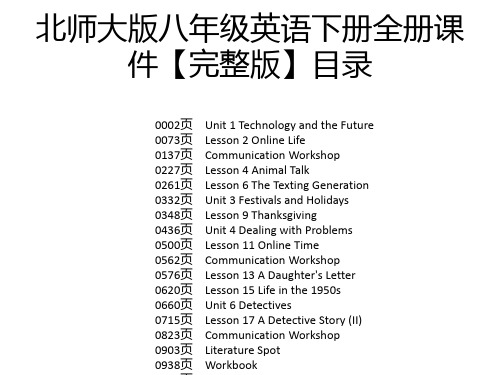
Communication Workshop
北师大版八年级英语下册全册课件 【完整版】
Unit 3 Festivals and Holidays
北师大版八年级英语下册全册课件 【完整版】
北师大版八年级英语下册全册课件 【完整版】
Lesson 3 Tomorrow's Jobs
北师大版八年级英语下册全册课件 【完整版】
Communication Workshop
北师大版八年级英语下册全册课 件【完整版】目录
0002页 0073页 0137页 0227页 0261页 0332页 0348页 0436页 0500页 0562页 0576页 0620页 0660页 0715页 0823页 0903页 0938页
Unit 1 Technology and the Future Lesson 2 Online Life Communication Workshop Lesson 4 Animal Talk Lesson 6 The Texting Generation Unit 3 Festivals and Holidays Lesson 9 Thanksgiving Unit 4 Dealing with Problems Lesson 11 Online Time Communication Workshop Lesson 13 A Daughter's Letter Lesson 15 Life in the 1950s Unit 6 Detectives Lesson 17 A Detective Story (II) Communication Workshop Literature Spot Workbook
北师大版八年级英语下册全册课件 【完整版】
北师大初二英语下册unit
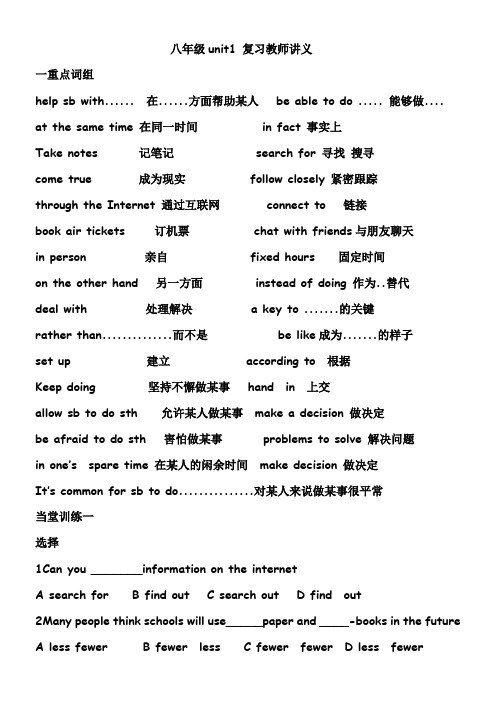
八年级unit1 复习教师讲义一重点词组help sb with...... 在......方面帮助某人 be able to do ..... 能够做.... at the same time 在同一时间 in fact 事实上Take notes 记笔记 search for 寻找搜寻come true 成为现实 follow closely 紧密跟踪through the Internet 通过互联网 connect to 链接book air tickets 订机票 chat with friends与朋友聊天in person 亲自 fixed hours 固定时间on the other hand 另一方面 instead of doing 作为..替代deal with 处理解决 a key to .......的关键rather than..............而不是 be like成为.......的样子set up 建立 according to 根据Keep doing 坚持不懈做某事 hand in 上交allow sb to do sth 允许某人做某事 make a decision 做决定be afraid to do sth 害怕做某事 problems to solve 解决问题in one’s spare time 在某人的闲余时间 make decision 做决定It’s common for sb to do...............对某人来说做某事很平常当堂训练一选择1Can you _______information on the internetA search forB find outC search outD find out2Many people think schools will use_____paper and ____-books in the future A less fewer B fewer less C fewer fewer D less fewer3 i will buy clothes online _______shopping in marketA instead ofB rather thanC set up4 Reading a lot is _______learn English wellA a key toB a key forC a way to5 In my spare time i always ___________in a coffee shopA chat to friendsB chat with friendsC play basket ball根据中文完成句子1你经常在课后帮助你的妈妈做家务吗?Do you usually _________your mother ________________after school 2 你有能力独立解决这个问题吗?_______you______________solve the problems alone?3 妈妈允许我在周末看电视My mum __________me ______________________ T v on weekends. 4在课堂上使用智能手机来做笔记将会成为可能。
北师大版英语八年级下册Unit 1 Lesson 2 Online Life 教案

Unit 1 Technology and the Future Lesson 2 Online Life教案教学内容:北师大版英语八年级下册Unit 1 Technology and the Future Lesson 2 Online Life局部内容。
教学目标(Objectives):1.确保学生认识和理解一些根本单词的意义和简单口头运用〔To learn the meaning and simple usages of some words and phrases〕。
2.学习使用本单元重点句型及表达〔To use the typical sentences to express〕。
3.鼓励学生大胆发言及表达〔To encourage the students to express bravely〕。
4.培养学生对英语学科的兴趣〔To make the students interest in English learning)。
5.增强学生听说读写译的能力〔To strengthen the ability of listening, speaking, reading, writing and translating)。
教学重点〔Key Points):在学习了单词的根底上,以单词为载体,进展主要句型的学习,并了解其中的语法现象,根据具体情境,学会交流对话,侧重句型语法学习,交际意向和课外拓展为重点。
教学方法:游戏,音频,情景教学法,Pair-work两人小组活动,Group-work小组活动,多媒体辅助教学。
教学难点:学生处于初中阶段,对英语有了初步了解,有了一定的词汇储藏,对于八年级下学期学生的要求重点是在会读会说的根底上,能掌握一些根本单词的拼写和造句,了解一定的语法内涵,与人进展简单沟通交流。
教学准备:课件、照片素材、音频文件、教学道具。
教学设计:Step1. GreetingStep2.Warm-up/Leading〔热身/课程导入〕Warm-up QuestionLook at the words and the websites. Which of these things do you or your parents do online?Key words:Book air tickets, chat with friends, check the weather, so medical checks, do shopping, find a job, listen to music, look at maps, pay bills, read emails, read the news, watch filmsStep3.Presentation(呈现新课〕1.Words Learning!1)教师放映课件,用中文询问同学看到了什么?同学们会看到课件上呈现的图画。
北师大版八年级英语下知识要点

八年级下units 1-10知识点Unit 1 Will people have robots1. see sb. do sth. 看见sb.做某事(的全过程);see sb. doing sth. 看见sb.正在做某事(片断)2.没有具体的数目用“hundreds of+名词(复数)”表示“数以百计的”有具体的数目时,用“基数词+hundred+名词(复数)”,hundred后不能有s,也不能用介词 of。
(类似的词还有thousands of; millions of)3.一段时间 + from now (从现在起)…之后; from now on = in the future今后eg. twenty years from now 今后20年4. 肯定句:I think (that)…. 否定句: I don’t think (that)….一般疑问句:Do you think …特殊疑问句:What do you think…..5. study at home on computer辨析:on,in和with.on:表示使用通讯工具、信息或传媒,乘坐交通工具等;in:使用语言文字等媒介; with:借助具体的手段或工具。
Eg. I don’t want to talk about it on the phone.Can you speak it in EnglishDon’t write it with a red pen.3. Will people use money in 100 years“in+时间”结构常与一般将来时连用,对其进行提问时用特殊疑问词how soon.4. before 可用于任何时态 ago 与过去时连用5. fewer people 更少的人(fewer修饰名词复数,表示否定)less free time 更少的空闲时间(less修饰不可数名词,表示否定)6. in ten years 10年后(in的时间短语用于将来时,提问用How soon)7. live alone 单独居住;feel lonely 感到孤独(比较:live alone/go along等)The girl walked alone along the street, but she didn’t feel lonely。
北师大版英语八年级下册 Unit 1 Lesson 1 Schools of the Future

Warm-up
Look at the photo. Which do you think will be useful at school? Why?
robot teachers
online learning
Warm-up
Example: I think smart ID will be useful at
(为什么火车迟到了)
Speaking Part!
Discuss schools of the future with your partner.
Example A: Will future schools have classrooms? B: I think they will because…
Unit 1 Technology and the Future
Lesson 1 Schools of the Future
Objectives:
1 Be able to read!
2 Be able to listen!
3 Be able to understand!
4 Be able to
communicate!
2
Many teachers do not believe there will be traditional classes or classrooms. Each student in a class might study different materials at the same time. Classrooms might be in open areas and use large LCD screens.
Grammar Part!
Object Clauses 宾语从句
- 1、下载文档前请自行甄别文档内容的完整性,平台不提供额外的编辑、内容补充、找答案等附加服务。
- 2、"仅部分预览"的文档,不可在线预览部分如存在完整性等问题,可反馈申请退款(可完整预览的文档不适用该条件!)。
- 3、如文档侵犯您的权益,请联系客服反馈,我们会尽快为您处理(人工客服工作时间:9:00-18:30)。
八年级unit1 复习教师讲义一重点词组help sb with...... 在......方面帮助某人 be able to do ..... 能够做.... at the same time 在同一时间 in fact 事实上Take notes 记笔记 search for 寻找搜寻come true 成为现实 follow closely 紧密跟踪through the Internet 通过互联网 connect to 链接book air tickets 订机票 chat with friends与朋友聊天in person 亲自 fixed hours 固定时间on the other hand 另一方面 instead of doing 作为..替代deal with 处理解决 a key to .......的关键rather than..............而不是 be like成为.......的样子set up 建立 according to 根据Keep doing 坚持不懈做某事 hand in 上交allow sb to do sth 允许某人做某事 make a decision 做决定be afraid to do sth 害怕做某事 problems to solve 解决问题in one’s spare time 在某人的闲余时间 make decision 做决定It’s common for sb to do...............对某人来说做某事很平常当堂训练一选择1Can you _______information on the internetA search forB find outC search outD find out2Many people think schools will use_____paper and ____-books in the futureA less fewerB fewer lessC fewer fewerD less fewer3 i will buy clothes online _______shopping in marketA instead ofB rather thanC set up4 Reading a lot is _______learn English wellA a key toB a key forC a way to5 In my spare time i always ___________in a coffee shopA chat to friendsB chat with friendsC play basket ball根据中文完成句子1你经常在课后帮助你的妈妈做家务吗?Do you usually _________your mother ________________after school?2 你有能力独立解决这个问题吗?_______you______________solve the problems alone?3 妈妈允许我在周末看电视My mum __________me ______________________ T v on weekends.4在课堂上使用智能手机来做笔记将会成为可能。
It will be____________to use smart phones in the class to __________________- . 5同一时间,不同的学生在做不同的阅读练习。
Different students are doing different reading ____________________.6在固定的时间固定的工作很无聊It’s boring to work__________________________________________7对于很多人来说经常换工作是一件和普通的事情.It is common _________ for people ________________________very often.8今天天气很热,我想去游泳不想去逛街。
It’s hot today,i want to go swimming ____________________go shopping.9新年晚会就要到了,你准备好了吗?The New Year party is coming,________________________it.10拥有应对困难的能力对我来说非常重要。
It’s____________________________________________to deal with difficult situations.二重点语法宾语从句句型结构主语+谓语动词+引导词+主语+谓语+宾语引导词:what、why、that(可省略)、when 、if 、whether、等从句语序为陈述句语序(1) that引导宾语从句时, that可省略。
Eg: She said,“I want to go there ” She said (that) she wanted to go there.一般情况下,whether 和if 可以互用,但有些情况例外a. 介词短语后只用whether 不用ifeg: We are talking about whether we'll go on the panic.b. 引导词与动词不定式或or not连用时,只用whether.eg:I can’t say whether or not he will come on time2.宾语从句时态a.主句为一般现在时,从句不受主句的限制eg: Do you know if/whether he has seen the film?I’m sorry to hear that your father is ill.She says she is going to go to Beijing next week.He tells me that his sister came back yesterday.当堂练习21.Have you decided ________for Australia?A. when will you leaveB. when do you leaveC. you will leave whenD. when you will leave2.Can you tell me _________ ?A. where does Tom liveB. where Tom livedC. Tom lives whereD. where Tom lives3.The old man asked me ________ .A. where was the cinemaB. where is the cinemaC. where the cinema wasD. where was the way to the cinema4.I think _______ you will like him.A. thatB. ifC. whyD. how5.I didn’t know _______ he will come or not.A. thatB. whetherC. weatherD. how6.I wonder _________ .A. how much cost these shoesB. how much do these shoes costC. how much these shoes costD. how much are these shoes cost8.Ask him ___.A. whose cup this isB. whose cup is thisC. this is whose cupD. whose is this cup9.I don’t know _________ .A. what time the movie startsB. what time starts the movieC. the time to start the movieD. the movie what time starts10.The doctor asked me how long ________ .A. was I illB. have I been illC. I have been illD. I had been ill11.The weather forecast doesn’t say _________.A. if it rains tomorrowB. if does it rain tomorrowC. if it will rain tomorrowD. if will it rain tomorrow12.They want to know _________?A. where is the hospitalB. how old are youC. when the train will leaveD. why is the boy crying13.No one knows ___ the professor will come to our school tomorrow to give us a talk or not.A. whenB. whetherC. whereD. if14.No one told us _________, so we need your help.A. how should we doB. what we should doC. what to doD. what should we do15.He asked me _________.A. whether I find out the sender of the moneyB. whether did I find out the sender of the moneyC. whether the sender of the money found outD. whether I found out the sender of the money16. I can't understand _____.A. what does Christmas meanB. what Christmas does meanC. what mean Christmas doesD. what Christmas means每日一练阅读1A young officer was at a railway station. On his way home, he wanted to telephone his mother to tell her the time of his train, so that she could meet him at the station in her car. He looked in all his pockets, but found that he did not have the right money for the telephone, so he went outside and looked around for someone to help him.At last an old soldier came by, and the young officer stopped him and said,"Have you got change for ten pence?""Wait a moment, " the old soldier answered, beginning to put his hand in his pocket, "I'll see whether I can help you. ""Don't you know how to speak to an officer?" the young man said angrily. "Now let's start again. Have you got change for ten pence?""No, sir, " the old soldier answered quickly.60. The young officer wanted to telephone his mother to tell her _________. ( )A. that he was going to visit herB. when his train would leaveC. when his train would arriveD. that he was now at the railway station61. He looked around for help because he _________. ( )A. didn't have coins for the phone callB. had no money to make the phone callC. didn't have the local moneyD. wanted to change money62. The old soldier _________. ( )A. was glad to help himB. didn't know if he had coinsC. didn't want to help himD. was angry63. The young officer was angry because he thought the old soldier _________. ( )A. didn't know how to speak to himB. didn't want to help himC. didn't answer him correctlyD. was not friendly to him64. The old soldier in the story was_________. ( )A. cleverB. stupidC. politeD. friendly二December 25 is Christmas Day(圣诞节). Christmas is an important holiday in many countries. On Christmas Day, most families get together for a big dinner. They give presents to each other and visit friends. The Christmas tree is an important part of the Christmas holiday. Most families buy trees. The families decorate(装饰) the tree together. Parents usually tell their children that FatherChristmas comes during the night and brings presents to good children. Of course, Father Christmas isn’t real. The parents of the children are really “Father Christmas”. They put the presents under the tree or into their children’s stocking(长统袜) after the children go to sleep.41. When is Christmas Day? __________.A. November 25B. December 25C. December 24D. December 2642. What do most families in America do on Christmas Day? __________.A. They only have a big dinner togetherB. They have a big dinner, exchange (交换) presents and visit friendsC. They just visit friends and exchange presentsD.They exchange presents only43. Who is really “Father Christmas”? ___________.A. Their parentsB. Their fatherC. Their motherD. Father Christmas44. When Christmas Day is coming, the parents __________.A. usually tell their children that Father Christmas isn’t realB. tell their children that Father Christmas comes during the night and brings presents to good childrenC.sometimes tell their children that Father Christmas comes during the dayD.often tell their children that Father Christmas gives presents to poor children45. When did parents put the presents into their children’s stocking? __________.A. Before the children go to sleepB. After the children go to sleepC. December 26D. At midnight of December 25完型填空When Mr Smith retired(退休), he bought a small 1 in a village near the sea. He2 it and hoped to live a quiet life in this house.But to his great surprise, many tourists came to see his house in summer holidays, for it was the most 3 building in the village. From morning to night there were4 outside the house. They kept looking into the rooms through the windows and5 of them even went into Mr Smith’s garden. This was too much for Mr Smith. He decided to ask the visitors to6 . So he put a notice on the window. The notice said, “If you want7 your curiosity(好奇心),come in and look round. Price: twenty dollars.” Mr Smith was s ure that the visitors would8 coming, but he was wrong. More and more visitors came and Mr Smith had to9 every day showing them around his house.“I came here to 10 not to work as a guide(导游),”he said angrily. In the end, he sold the house and moved away.()1.A. garden B. shop C. house D. school()2. A. liked B. hated C. sold D. built()3. A. big B. interesting C. small D. clean()4. A. children B. students C. parents D. tourists()5. A. no B. none C. many D. much()6. A. come B. leave C. stay D. play()7. A. to satisfy B. satisfy C. to satisfying D. satisfying ()8. A. go on B. stop C. continue D. not()9. A. take B. cost C. spend D. pay()10. A. play B. work C. watch D. retire。
